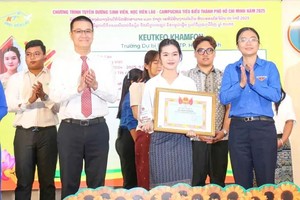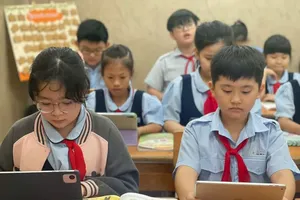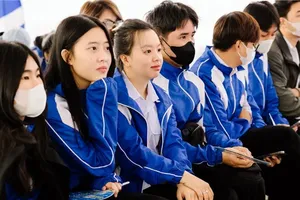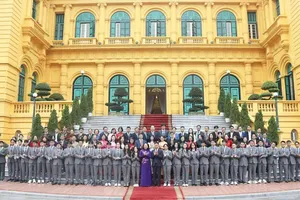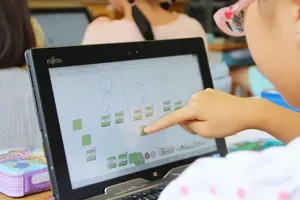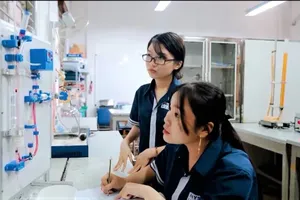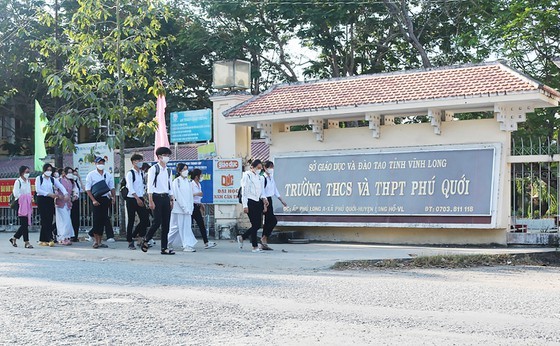 Students in Vinh Long Province in the Mekong Delta come back to schools in person
Students in Vinh Long Province in the Mekong Delta come back to schools in person
According to a quick report of educational units in the southern metropolis, the rate of students going to school on the first day of the year is more than 98 percent. Students take part in activities in their classroom, avoiding large crowds of students in the schoolyard.
Some schools have organized two learning shifts for students but most still maintain blended learning, a pedagogical approach combining face-to-face teaching with online course delivery.
Sixth graders will be guided to get used to the new learning environment, guide learning methods, and make a personal study plan before returning from February 7 to 12 before they start direct learning at schools from February 14.
Preschool and primary schools are preparing to welcome students back to schools from February 7 to 10. From February 10 to 13, educational institutions will hold a meeting with parents and students, noticing several issues to call for parents’ cooperation with schools in disease prevention. From February 14, parents of children in kindergartens and primary schools decide whether their children stay home or go to schools.
The Department of Education and Training of Ho Chi Minh City noted that educational institutions in epidemic areas of level 1 (or green areas) can organize two learning shifts a day, part-boarding, and elective educational activities such as English classes with foreigners, life skills, after-school clubs from February 14 for all grades according to parents’ requirement.
Educational facilities in districts with the alert disease level 2( the disease is contained but there is a risk of community transmission) only organize double learning shifts a day and semi-boarding for students of grades 1, 2, 5 while third and fourth graders at these schools learn one shift. Schools in districts with the alert disease level 3, students of grades 1, 2, and 5 attend one learning shift per day and students of grades 3 and 4 continue to study online whereas their peers of all grades in districts with the Covid-19 alert level must learn on the internet.
In the Mekong Delta, Director of Vinh Long Department of Education and Training Truong Thanh Nhuan yesterday went to Phu Quoi Middle School and High School in Phu Quoi Commune in Long Ho District to inspect teaching and learning directly and prevention of the Covid-19 epidemic.
According to the plan of the Department of Education and Training of Vinh Long Province, students in grades 9 and 12 will return to school to study directly from February 7 while students of the remaining grades continue to learn in the form of their choice. Vinh Long has over 20,000 students in grades 9 and 12 returning to schools directly. Most of the students have had two doses of the Covid-19 vaccine while most of the teachers have got booster doses of vaccine.
On the same day, many students from grade 7 to grade 12 in Tien Giang Province also returned to schools. Secondary schools and high schools in My Tho city are all equipped with automatic body temperature monitors. Medical staff and teachers guide students to asked students not to gather in the schoolyard.
Elsewhere in the Mekong Delta, Director of the Department of Education and Training of Kien Giang Province Tran Quang Bao said that before Tet, all schools had cleaned classrooms, asking students’ parents to manage their children on Tet holiday, ensure traffic safety, limit crowded gatherings and ensure 5K, and stay healthy.
Schools from kindergarten to high school in the Mekong Delta City of Can Tho have also started to welcome students to study directly.
According to the Ministry of Education and Training, about 17 million students from grades 7 and above across the country can go to school directly on February 7. Currently, all universities and colleges have planned for students and trainees to return to school in February. All provinces and cities plan to welcome students back to school from February 7 to February 14. Before the Lunar New Year holiday, northern provinces of Bac Kan, Cao Bang, Lai Chau, Yen Bai, Ha Giang, Thai Binh, Ha Nam had provided direct teaching.
